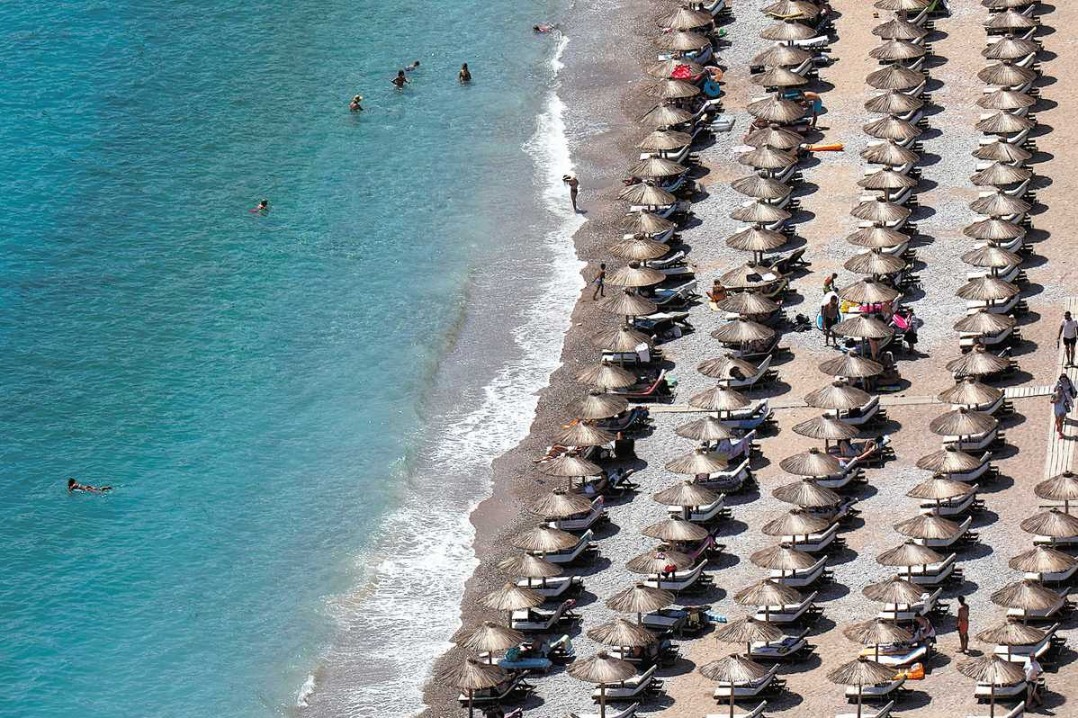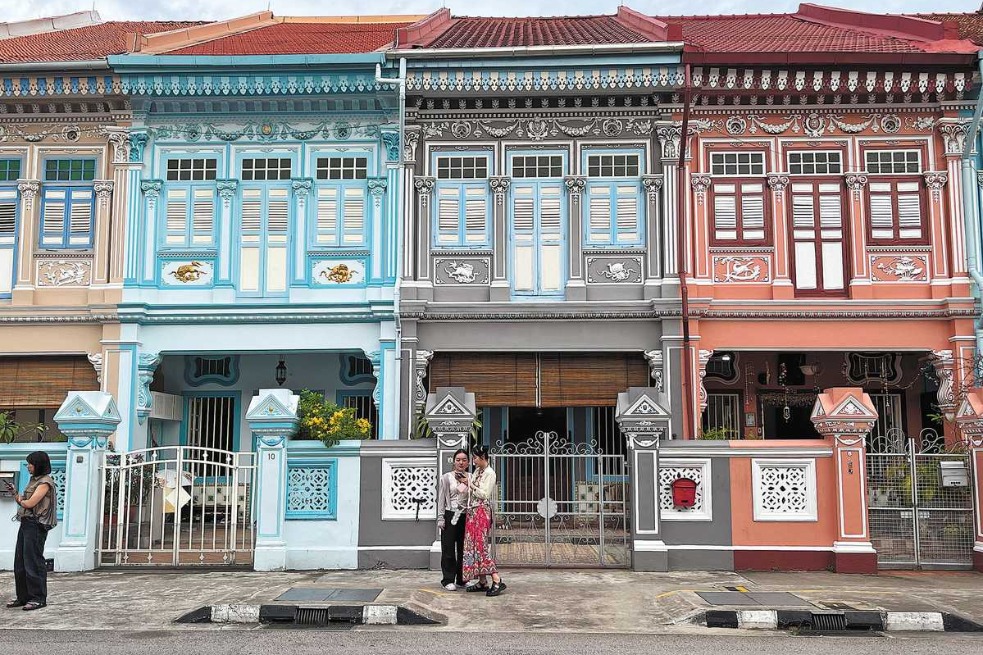Why are air conditioners rare in European nations?

When I first arrived in Brussels trying to rent an apartment, I had an amusing exchange with a local real estate agent while touring a property built in the 1960s:
Me: "Don't you think this place is a bit too old? It's more than 20 years older than I am!"
Agent: "In Belgium, your definition of an 'old building' may need some adjustment … The next place I'm going to show you is over 200 years old, built during the Napoleonic Wars. You'll be living inside history!"
Me: "Thanks, but no thanks. I'd prefer something from my own or my daddy's generation — grandpa's at most."
That wasn't an unreasonable request. Not only in Brussels, but across the whole Europe, many of the homes for rent or sale are far older than one might expect. One of the properties the agent showed me had been built in 1874 — just a year after Napoleon III died. Another little white house didn't have a precise construction date, but a plaque by the door revealed that Karl Marx once lived there.
Aged houses are one key to understanding why many Europeans complain about one distinctly modern inconvenience: the scarcity of air conditioning. In China, it's hard to find a residential building without air conditioners mounted all over the exterior walls. According to the International Energy Agency, over 90 percent of US homes had air conditioning by 2022, while in Europe, that number hovers between 20 and 30 percent.
Why are air conditioners so rare in Europe, even as summers are growing hotter and unbearable?
One key reason is the age of the buildings themselves. Many homes were built long before air conditioning — or even modern electricity system — existed, and they, standing for two or more centuries, were designed with defense in mind. These buildings typically have thick walls, high ceilings, and small windows. The goal wasn't comfort, but security — making them hard to invade and easy to defend.
A high ceiling may look grand for this purpose, but in winter it's a nightmare. Middle school physics tells us that warm air rises, so even when you crank up the heat, the warmth floats uselessly above your head. Most of these homes receive poor energy-efficiency ratings for good reason.
Adding modern systems to these structures is a logistical headache. There were no electrical grids or plumbing systems when they were built, so there's no room to run modern wiring, pipes, or HVAC ducts. HVAC stands for heating, ventilation and air conditioning. Drilling through walls built from fortress-grade stone isn't easy. These are materials designed to withstand cannonballs, not accommodate coolant lines or mounting brackets for outdoor compressor units. Belgian law — like that in many European Union countries — requires homes to have safe electrical wiring, heating, plumbing, and basic fire protection before they're considered habitable. That seems reasonable, but getting a 200-year-old home to meet even those basic standards is often difficult and expensive. When you can barely get the power and water systems working, installing an air conditioner becomes a luxury that few landlords prioritize.
Even if the building starts to crumble, you can't just tear it down and rebuild. Many old structures are legally protected, classified as historical or cultural heritage. In such cases, the law often forbids complete demolition and requires that the original facade be preserved, even if everything else needs to go.
So, in a uniquely European work-around, developers often strip the interior bare, gutting everything down to the last beam, while leaving one lonely wall standing. That way, the project is still technically a "renovation", not a rebuild, and the law is satisfied.
Of course, old buildings aren't the only reason air conditioning is rare. Geography also plays a role. Many of Europe's major cities are located at high latitudes. Paris sits at 48 degrees, 48 minutes north latitude, Brussels at 50 degrees, 48 minutes north latitude, and Berlin at 52 degrees, 30 minutes north latitude — the same latitude as Mohe, the northernmost town in China. Go not much farther north and you're in Siberia. At these latitudes, summer isn't traditionally hot enough to make air conditioning essential. Berlin's average daily temperature in August barely climbs above 20 C. In that context, an air conditioner doesn't feel necessary most of the year.
Shaped by climate
Even Southern Europe isn't all that south. Rome, for instance, is at 41 degrees, 54 minutes north latitude — still farther north than Beijing. For centuries, most of Europe simply didn't need artificial cooling. The architecture, habits, and expectations were shaped by a different climate.
But global warming is rapidly changing that equation. Over the past decade, summer heat waves have become more frequent and more intense. Countries like France, Germany, Belgium, and the Netherlands — once considered comfortably temperate — have seen record-breaking temperatures. Even in Brussels, where one might expect a mild July, the mercury has occasionally soared to nearly 40 C, making the inside of a stone house feel more like a kiln.
Energy costs are another major barrier. In Belgium, for example, the average electricity price for residential consumers is around 0.40 euros ($0.47) per kilowatt-hour. That's nearly seven times the average price in China. And European homes already consume a lot of electricity: cooking is often done with electric ovens and induction stoves, and heating in winter may involve electric radiators. Add in a few weeks of air conditioning, and monthly power bills can become hard to manage.
That's why fireplaces remain a practical solution for many. In fact, European supermarkets sell firewood as a household staple — something rarely seen in modern Chinese or East Asian cities. When heating a home means lighting a fire, and cooling it means opening the window, it's easy to see why the economics of air conditioning don't make much sense for many households.
There's also a cultural element at play. In countries like the US or China, air conditioning is taken for granted, even expected. In Europe, it's still viewed as something excessive, or even slightly decadent. Many Europeans grew up without it and simply accept sweating through the summer as part of the seasonal rhythm. Open the shutters in the morning, close them before noon, and drink plenty of cold water — that's the traditional way.
The IEA and other experts predict that air conditioning will become more common in Europe over the coming decades, especially as climate change continues to push summer temperatures to dangerous levels. But legal constraints, high costs, and architectural limitations will continue to slow its spread.
So for now, when you step into a charming old townhouse in Paris or Brussels during the summer, don't be surprised if you feel like you've entered a pizza oven. Because while Europeans love their history — and are determined to preserve it — it often comes at the cost of modern comfort. Air conditioning, like many other modern conveniences, still struggles to fit inside the stone walls of the past.
zhangzhouxiang@chinadaily.com.cn
The author is the China Daily EU Bureau Chief Correspondent based in Brussels.



































